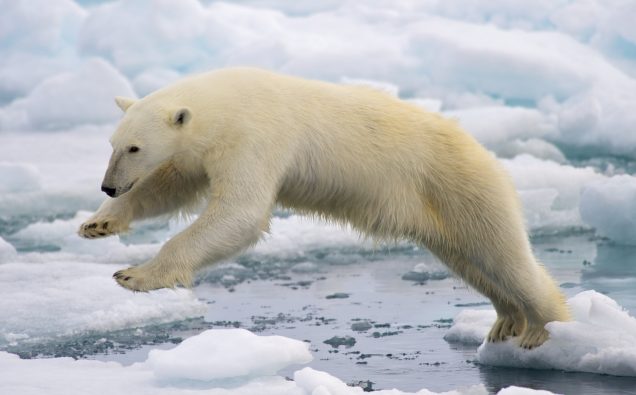
A polar bear jumping in Spitsbergen Island, Syalbard, Norway. Photo Credit: Arturo de Frias Marques/Wikimedia Commons
The Bonn Conference opening on Monday will be yet another step in the search for world commitment to climate action.
“While Paris represented one of those moments where the best of humanity achieved an agreement so important to our collective futures, Bonn represents how we will move forward to fulfill its promise,”says the Executive Secretary of United Nations Framework Convention on Climate Change (UNFCCC), Patricia Espinosa.
A year after the historic Paris Agreement, the world is still far from what needs to be done to stem climate deterioration and with it the much precarious ramifications for the planet, humans, animals and plants.
“We are running out of time to turn things around. To do so, we must significantly increase our efforts to reduce emissions and our carbon footprints,” she says.
Adopted by the 196 Parties to the UNFCCC in December 2015 in the French capital, the Paris Agreement urges countries to combat climate change by limiting the rise of global temperature below 2 degrees Celsius and strive not to exceed 1.5 degrees Celsius.
The United States, the largest world economy with a huge industrial output, has announced to withdraw from the treaty, and President Donald Trump has indicated he would be willing to re-negotiate it “on terms that are fair to the United States.”
But other major economic powers have said they would steadfastly follow the agreement.
The Bonn Conference, informally known as COP 23, countries will seek to move forward in completing the rule book for operationalizing the Paris Agreement. The Conference, which runs until 17 November, is chaired by Fiji, an island State particularly affected by the impacts of climate change.“Never has our work been more necessary. We see this with respect to the extreme weather events affecting almost every continent throughout the world,” said Ms. Espinosa.
A similar emphasis comes from COP 23 President and Fiji Prime Minister Frank Bainimarama.
“We can no longer ignore this crisis. Whether it is fires in California, Portugal and Spain. Flooding in Nigeria, India and Bangladesh. The dramatic Arctic melt. Ice breaking off the continent of Antarctica. The recent hurricanes that devastated the Caribbean and the southern United States […] It’s hard to find any part of the world that is unaffected by these events”, he said at the ministerial meeting in Fiji, according to the United Nations.
The conference takes place amidst unprecedented natural disasters, continuing rise in the atmospheric levels of CO2, melting ice on the arctic, flooding in parts of Europe and Asia, famines on the African continent, recent hurricanes in the United States, ocean warming, fires that raged in California and smog in mega Chinese and Indian cities.
Economists fear major impact of natural disasters and long-term climatic troubles.
The United States is so far experiencing yet another mild winter and summers appear to be expanding their duration.
The growing number of disasters – though not entirely due to climate change – must ring alarm bells for those who deny climate change or its links to human activity.
Recently, the World Meteorological Organization (WMO) announced that the levels of carbon dioxide (C02) surged at “record-breaking speed” to new highs in 2016.
According to the United Nations, the Bonn Conference will feature a series of meetings and events, including the high-level segment, on 15 November and 16 November, attended by Heads of State and Government, Ministers, and UN Secretary-General António Guterres.
UN Chief Guterres has invited leaders to consider championing six high-impact areas at a special Climate Summit in 2019. These areas are investment in clean technology, maturing carbon pricing, enabling the energy transition, risk mitigation and building resilience, augmenting the contribution of sub-national actors and business and mobilizing climate finance.
“Increasing ambition is the only way to keep the global temperature rise well below 2 degrees Celsius this century, and as close to 1.5 degree as possible. By focusing on these sectors, we can substantially reduce the gap between where we are and where we need to be,” said UN Deputy Secretary-General, Amina Mohammed, at the pre-COP meeting in Fiji.
A series of events planned at the Bonn conference, will showcase how cities, regions, private sector companies and investors are trying to implement the Paris Agreement in the areas of energy, water, agriculture, oceans and coastal areas, human settlements, transportation, industry, and forests.
But what happens post-Bonn conference will be immense significance to the future of the planet and the humanity.





![By Maryphillips1952 (Own work) [CC BY-SA 4.0 (http://creativecommons.org/licenses/by-sa/4.0)], via Wikimedia Commons](https://www.viewsnews.net/wp-content/uploads/2016/02/Mono_Lake_California_August_2014.jpg)












